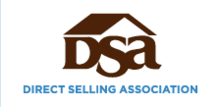Direct Selling Association
 |
|
| Formation | 1910 |
|---|---|
| Purpose | Trade association for direct marketing companies |
| Headquarters | Washington DC |
|
Membership
|
approx. 200 companies |
|
Chairman
|
David B. Holl |
| Website | dsa |
The Direct Selling Association (DSA) is the name of several similar trade associations in the United States, United Kingdom, Australia, Malaysia, Singapore, and New Zealand that represent direct selling companies, primarily those that use multi-level marketing compensation plans. On behalf of its members companies, the DSA engages in public relations and lobbying efforts against regulation of the multi-level marketing industry, and it funds political candidates through a political action committee.
The American DSA, headquartered in Washington, D.C., is the national trade association of a group of firms that manufacture and distribute goods and services sold directly to consumers typically through multi-level marketing.
Founded in Binghamton, New York in 1910 as a trade group for door-to-door salesmen, the association was originally called the Agents Credit Association. It was renamed the National Association of Agency Companies (NAAC) in 1914, and briefly renamed the National Association of Agency and Mail Order Companies in 1917, before returning to the NAAC in 1920. It became the Direct Selling Association in 1968. As of 1970, less than 5% of the DSA's members were multi-level marketing companies. By 2009-2011, the DSA's membership had grown to include nearly 200 companies, more than 90% of which were multi-level marketing companies.
The DSA belongs to the National Retail Federation and its member companies pledge to abide by the DSA code of ethics.
As of 2011, the DSA has sister organizations in the UK (with over 40 member companies), Australia (nearly 70 member companies), and Israel (7 member companies),
The DSA serves as a public relations and lobbying group acting on behalf of its member companies. The DSA played a role in petitioning the Federal Trade Commission (FTC) to exempt multi-level marketing companies from consumer protection regulations outlined in the FTC's 2006 proposed Business Opportunity Rule, encouraging people to write 17,000 form letters complaining about the rule from 2006 to 2008. The law was passed in 2012, with most multi-level marketing companies considered exempt.
...
Wikipedia
